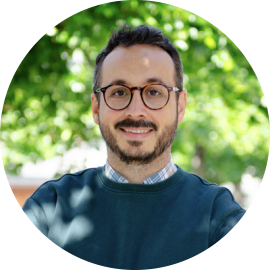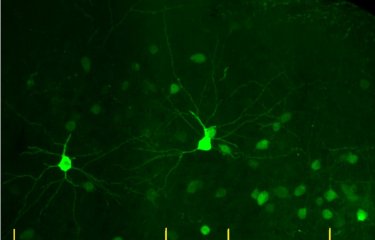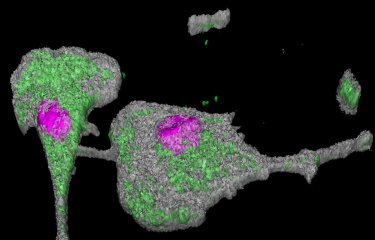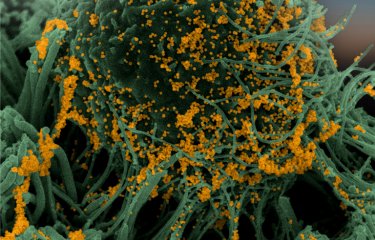The Brazilian-born scientist has devoted his career to exploring the links between viral infections and the brain. He specializes in neurotropic viruses and is working to elucidate the infectious mechanisms underpinning the SARS-CoV-2 and rabies viruses. With a transcontinental background, a passion for science and a coherent approach to research challenges, Guilherme Dias de Melo is driven by an unwavering curiosity… and a deep desire to be useful.
From São Paulo to Paris
Guilherme spent his childhood in Araçatuba, in the state of São Paulo in Brazil. He was born into a close-knit family, who supported him in his choice to pursue a career in science. Growing up surrounded by cats and dogs, he naturally opted to embark on veterinary studies at UNESP public university. He immediately developed an intense curiosity for disease mechanisms and brain function and decided to move away from clinical practice and focus on research. After an initial internship in veterinary pathology, he turned his attention to the links between infections and the nervous system. During the course of his PhD, which he began in Brazil, he came to the Institut Pasteur in 2014 for a one-year research stay, before later returning as a postdoctoral fellow. He was successful in the research associate competition in 2022 and has now settled in Paris.
When viruses disrupt the brain
Guilherme specializes in neurotropic viruses and is currently working in Hervé Bourhy's laboratory on the rabies virus, which is used as a model to better understand how pathogens invade the brain. Since the pandemic in 2021, his research has been focused on the SARS-CoV-2 virus and how it relates to the symptoms of long COVID.

My aim is to understand how the virus is able to enter the brain, remain present at low levels and trigger persistent symptoms including anxiety, memory problems and depression. He uses cellular models to try to elucidate the mysteries of this viral persistence and its neurological consequences.
He uses cellular models to try to elucidate the mysteries of this viral persistence and its neurological consequences.
Improving understanding to protect health
His vocation is clear: by studying how pathogens interact with the brain, he hopes to improve prevention and diagnosis and ultimately find treatments for the infections they cause. An ongoing aim is to identify therapies for rabies, which is still invariably fatal after the onset of symptoms. Guilherme also wants to help secure recognition for long COVID as a major medical concern, and he has joined the "Coordinated Action for Long COVID" group run by France's ANRS-MIE agency.
Every project he embarks on is driven by the same goal of advancing knowledge to improve public health. What spurs him on is the idea that he can help society live better.
The Institut Pasteur: a unique ecosystem
Guilherme's first contact with the Institut Pasteur was a revelation. He was immediately drawn by the history of the place, the intense scientific activity and technical facilities assembled on a single campus, and he has made his career here. He particularly values the state-of-the-art equipment, concentration of expertise and outstanding possibilities for collaboration. This setting has enabled him to explore demanding research questions using cutting-edge tools, for example studying the electrical activity of infected neurons or using stem cells that have been differentiated in vitro.
Scientific rigor and compassionate commitment
Guilherme is constantly curious, fascinated by history and civilization, and he is also a global citizen – Brazilian, Italian, and an adopted Parisian for more than a decade.
Although he admits sometimes missing Brazil, his family and the sunshine, in Paris he has found a balance between a demanding career and personal fulfillment. He advocates for science to be more open and explained more clearly to the public, and he warns about the difficulties facing young scientists, especially PhD students. He believes that working conditions for researchers need to be reconsidered and steps taken to secure a stable future for early career scientists.
Key dates in Guilherme's career
Since July 2022: Expert Researcher, Lyssavirus Epidemiology and Neuropathology Unit, Institut Pasteur, Paris, France
Professional experience
2018-2022: Post-doctoral fellow in the “Lyssavirus, epidemiology and neuropathology” unit, Institut Pasteur, Paris, France
2018: Visiting researcher at the technology development platform, Institut Pasteur Korea, Seongnam, South Korea
2015-2017: Post-doctoral fellow in the “Trypanosomatid infectious processes” laboratory, Institut Pasteur, Paris, France
2011-2015: Research assistant at the Laboratory of Applied Pathology, São Paulo State University (UNESP), Araçatuba, Brazil
2012: Visiting researcher at the Institute of Veterinary Pathology, Justus-Liebig University, Gießen, Germany
Affiliation
Since 2022: Member of the “Covid long coordinated action” group of the ANRS-MIE agency, France.
Education
2025: Habilitation à diriger des recherches (HDR), Université Paris Cité, UFR Sciences du Vivant.
2015: PhD in medical and surgical pathophysiology, Faculty of Veterinary Medicine, São Paulo State University (UNESP), Araçatuba (Brazil).
2012: Master's degree in veterinary medicine, Faculty of Veterinary Medicine, São Paulo State University (UNESP), Araçatuba (Brazil).
2010: Doctor of Veterinary Medicine (honorary degree), Faculty of Veterinary Medicine, São Paulo State University (UNESP), Araçatuba (Brazil).





